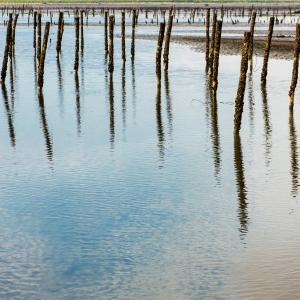Min-Ah Cho is assistant professor of theology and spirituality at St. Catherine University in St. Paul, Minnesota.
Posts By This Author
The Lives of Others
Reflections on the Revised Common Lectionary, Cycle A and B
WE LIVE IN A TIME of widespread violence. No country, no community, no person is untouched by violence. It is a complex problem stemming from our thought patterns and actions that are, in turn, shaped by various forces in our daily lives. Because violence is so complex, we often seek an easy answer—typically, naming a specific religion, culture, ethnicity, or nationality as a cause of the evil that perpetrates or stimulates violence.
But we all know that such scapegoating is another crime that only creates more violence. Each and every individual and community has good and bad, strength and weakness, merit and demerit. Just as no one is perfectly good, no one is perfectly evil. In her well-known book Eichmann in Jerusalem, philosopher and writer Hannah Arendt points out that evil is related to the lack of reflective thinking. “The longer one listened to [Eichmann],” writes Arendt, “the more obvious it became that his inability to speak was closely connected with an inability to think, namely, to think from the standpoint of someone else. No communication was possible with him, not because he lied but because he was surrounded by the most reliable of all safeguards against the words and presence of others, and hence against reality as such.”
For Arendt, to think reflectively means to be aware and to take into account the reality that one’s own life is always in relation to the lives of others. This is also what the biblical texts this month invite us to contemplate.
Orienting to New Horizons
Reflections on the Revised Common Lectionary, Cycle A
THE PROBLEM WITH Christianity today is not that Christians lack faith in God. The problem is that Christians believe they “know” and “understand” God completely. In a world overflowing with information, we hardly acknowledge the importance of God’s unknowability. Yet a conception of God that doesn’t recognize the unknowable keeps us in an uncritical banality, which in turn leads us to follow orders without questioning, to play it safe, and to go along with mass opinion.
For Christians, conversion is required. Theologian Bernard J. F. Lonergan defines conversion not simply as an acceptance of a new belief system, but rather as “a radical shift from an old horizon to a new horizon.” Religious conversion, in particular, is to “fall in love with God.” Thus, to convert is to deny the conventional, habitual belief and knowledge system, and to discover a new reality in which one becomes open and vulnerable to challenges. Conversion is not a solitary experience. It is a prolonged dialogue that constantly transforms one’s horizon and motivates us to wonder, appreciate, and raise more questions.
The texts for the next four weeks invite us to a conversion experience. They are reminders that conversion starts with abandoning any sense of security based on doctrines, dogmas, rituals, and systems of belief—precisely because God’s love never allows us to find comfort in human constructions.
A 'Discipleship of Equals'
Reflections on the Revised Common Lectionary, Cycle A
"Living the Word" reflections for October 2014 can be found here.
ACROSS DENOMINATIONS, Christians have attempted to build a more egalitarian and democratic ecclesiastical structure. The phrase “discipleship of equals,” coined by the feminist theologian Elisabeth S. Fiorenza, suggests that a community of Jesus’ followers cannot tolerate an absolute, centralizing power that justifies a relationship of dominance and subordination.
Yet, while Christians continue to challenge hierarchical structures in the church, we also acknowledge that a discipleship of equals will not be established simply by removing the hierarchy. The church is enmeshed in a concrete reality of everyday life, filled with a web of power relations that are neither fixed nor necessarily top-down.
Power relations experienced within the church are often inconspicuous. They take the form of microaggressions, subtle insults against other members because of gender, sexual orientation, race, class, and ability status. What is even more hurtful is that these insults are often disguised as “caring,” as when someone perverts a prayer request into gossip. The experience of the powers in the church can be paradoxical. Christians must deal with complicated and variegated claims to power, all of which borrow the name of God.
The texts for the next four weeks highlight the struggles in forming a community of God. They raise the question of power relations within the faithful community: How do we use the word “power” and what should be our first instinct in situations of conflict?
Who Do You Say I Am?
Reflections on the Revised Common Lectionary, Cycle A
AS A NATIVE KOREAN who has studied and taught in the U.S. for more than 13 years, I feel like I’m always swinging between two lands—neither giving me a sense of home. Nostalgia might be too gentle a word to describe this in-between space. Rather, it’s a bitter and unpleasant reality constantly reminding me that to some I appear “strange,” “irregular,” “awkward,” “unskillful,” or “suspicious.” In this situation, I remain “unnatural.”
I often feel the same way in the church. My ethnicity and gender are considered marks of “otherness”—even in my own denomination. Every waking moment I wrestle with this question: How can I incorporate my body, my culture, my language as a Korean woman theologian fully into the body of Christ? This wrestling, while uncomfortable, also prevents me from settling with easy or convenient answers. Perpetual dislocation leads me to pay attention to the unseen and unheard corners of the world. It demands I examine old convictions and construct a creative space for new ways of thinking about God, life, and the nature of justice and hope.
The majority of our biblical stories come from people who were also living outside their own land. They too were in some way dislocated. The biblical texts this month call particular attention to their emotions, tensions, and challenges. They invite all of us to feel lost with them, to tremble with them, and to be courageous with them.
Converted, But Still Wrestling
"From Willow Creek to Sacred Heart: Rekindling My Love for Catholicism"
SOME BOOKS MAKE you want to sit down with the author on a sunny afternoon for a nice cup of tea. You would be excited to talk about how the book resonated with your own journey. For me, From Willow Creek to Sacred Heart: Rekindling My Love for Catholicism, by Chris Haw, is such a book.
Haw, a young, passionate, and deeply self-reflective theologian, shares his spiritual memoir. Part one recounts Haw's faith journey from a childhood as a lukewarm Catholic to teenage years at the evangelical megachurch Willow Creek, to college—including brief but powerful months in Belize, as well as days of protest against the Iraq war—and eventually to his present life in the apocalyptic landscape of Camden, N.J., where he returned to the Catholic Church.
Part two presents Haw's theological reflections on a variety of questions he has raised along his journey. He also focuses on common objections against the Catholic Church, such as the nature of the Mass as a sacrifice, the church's reliance on human tradition over the Bible, its hierarchical system, alleged ritualism, embellished architecture and ornaments, devastating scandals—including child molestation—and so on. Haw explores such challenging issues thoughtfully and courageously, while humbly accepting that he still struggles with them. Despite it all, Haw longs to see beauty and hope furthered through the Catholic Church.
I am a Catholic convert. I was raised in a Methodist family and trained in Protestant seminaries. By the time I decided to convert to Catholicism, I was starting my first year in the doctoral program of theological studies at Emory University. Feminist theology played a central role in both my theological education and spiritual formation, and it continues to today.
'To Protect Peace'
Faith leaders and others protest a planned military base on a South Korean island.
IF YOU HAVE ever been to Jeju, you will understand why it is called a paradise. Lying in the waters south of the Korean mainland, this volcanic island is stunningly beautiful, from its clean mountain streams to its placid coral reefs. Jeju’s legendary female deep-sea divers harvest clams, abalone, and seaweed, relying on lung power alone. The island is also a spiritual place, said to be the body of Korea’s creation goddess, Mago. Jeju has been designated a UNESCO World Heritage Site and a World Biosphere Reserve.
Since January 2011, it’s also been the site where a $970 million naval base is being constructed by the South Korean government, with the help of giant construction corporations such as Samsung. The base, located in the small farming and fishing village of Gangjeong, will occupy a unique three-quarter-mile stretch of coastal wetland, threatening an ecological system that harbors several endangered species. The naval base construction also contributes to increasing military tensions in Asia, raising the risk of a devastating war in the region. Today, islanders, religious leaders, and peace activists are calling attention to dangers caused by joint U.S.-South Korean militarization.
The base is slated to be home to 20 warships, including submarines, aircraft carriers, and destroyers, several of them equipped with missile defense technology with the stated goal of protecting South Korea’s sea lanes and shielding against attack from North Korea. Civilian cruise liners will also be able to dock, according to the government. South Korean naval official Ku Okhyoe told a press conference last fall that U.S. military ships will be allowed to dock at the base only temporarily; Ku insisted, “The base is not intended for a certain country.”




